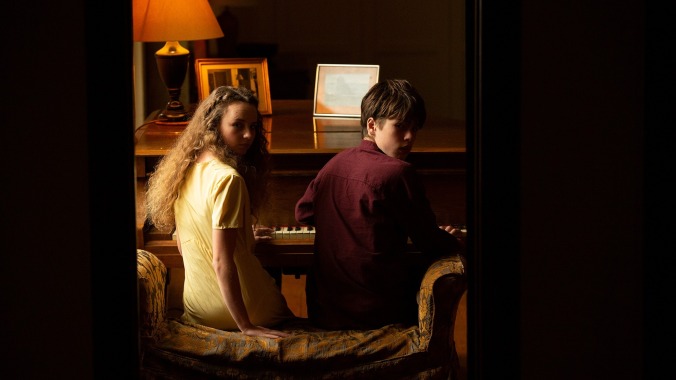Homebound's domestic cliches deliver lackluster chills
Hostile children and a dubious husband don't add to much in this character-driven horror film

Simplicity can be a boon to horror. Filmmakers do not necessarily need extensive special effects or a large budget to create tension and unease in their audiences, which seems to be the ethos behind writer-director Sebastian Godwin’s debut feature Homebound. But if a filmmaker isn’t going to impress with spectacle, something needs to fill the gap, whether it’s compelling characterization, thoughtful theming, or engaging visual technique. Rote recitation of plot points won’t cut it, and that’s the case with Homebound, a film that leans on withheld information to drive a mystery but lacks anything for viewers to latch onto emotionally.
The premise, at least, shows promise. When Richard (Tom Goodman-Hill) brings his new wife Holly (Aisling Loftus) to his ex-wife’s countryside home to meet his three children, things take a rather quick turn for the uncomfortable when the couple realizes that the children’s mother has effectively abandoned them for the duration of Richard’s and Holly’s stay. Youngest child Anna (Raffiella Chapman) is mostly pleased that her father came around for her birthday, but eerily silent elder siblings Lucia (Hattie Gotobed) and Ralph (Lukas Rolfe) are particularly icy to Holly’s intrusion on their lives.
Loftus’ performance carries Homebound with the weight of dual thematic thrusts: the fear of being unwanted as a new stepparent, and the realization that one’s new spouse may have darker dimensions. Loftus does a good job of managing the state of escalating unease that plays off those themes, even as the film around her fails to capitalize at a level that’s appropriately tense or horrific.
On one hand, Homebound expects that the creepiness of Lucia and Ralph should complement Holly’s outsider feelings with little more than a vague notion that they don’t like her very much. Their initially silent performances eventually give way to minimal dialogue, but whether this was a stylistic choice abandoned partway through scripting or filming or an inadequately conveyed alienating tactics by the kids is entirely unexplored. In fact, the central mystery around their mother’s absence does little to illuminate these characters. They are avatars of hostile stepchildren, but there isn’t much indication that any thought was given to their individual personalities beyond their hostility and (plausibly deniable) violent intentions toward Holly.
Sitting obnoxiously on the other hand is the running thread that Richard might not quite be the husband Holly envisioned him to be. The film doesn’t reveal much about Richard and Holly’s relationship prior to their visit, but Holly is continually shocked by how Richard interacts with his kids, whether he’s encouraging Lucia to coldly slaughter a captured goose for their dinner or pouring generous portions of alcohol for his underage family under the guise of birthday celebrations. The intention seems to have been to tie these elements of Richard’s character into the mystery of his ex-wife’s disappearance.
Yet the film casually dismisses the possibility of his involvement by demonstrating that his own suspicions are averted without Holly around to observe him, making the camera’s lingering, distrusting framing a strange miscalculation. This further detracts from moments when Richard is shown to be a demonstrably bad husband for ignoring Holly’s anxieties. Here the overarching tension revolves around his potential involvement in a mystery for which he is an overly obvious red herring, not the more pressing issue of whether Richard is simply duplicitous.
These scattershot attempts at exploring Holly’s alienation within her new family culminate in a third act and climax so abrupt that this 70-minute film feels unfinished. Most of the violence is left implied, with only mild blood splatter and the sounds of buzzing flies as signifiers that death haunts just outside the frame. But this alone doesn’t leave the experience incomplete. Holly doesn’t so much have an arc as a realization of the obvious, only to be cut short by the credits before she can actually do anything about it.
The resulting ambiguity doesn’t raise intriguing questions; it’s just a shrug that speaks to the woefully undercooked the ideas on display. Holly’s emotional journey is the only one that translates to the screen through Loftus’ performance, and she’s surrounded by hollow characters without internal lives. Homebound is nominally watchable–its short runtime certainly makes its predictability all the more forgivable–but it’s such a shallow experience that it’s instantly forgettable.